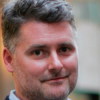Kevin Mattson

Kevin Mattson
Kevin Mattsonis an American historian and critic. Mattson received his B.A. from the New School and his Ph.D. from the University of Rochester. For several years he ran the Walt Whitman Center for the Culture and Politics of Democracy at Rutgers University,...
anonymous assessment difference faculty talking
There's a big difference (between the two approaches). They're talking about faculty representatives. We're talking about faculty-wide, anonymous voting, which I think is a much better assessment tool.
order skills issues
A democratic public forms when citizens gather together to deliberate and make public judgments about local and national issues that affect their lives. By associating together for public discussion, citizens learn the skills necessary for the health of a democratic public; listening persuading, arguing, compromising, and seeking common ground. When these skills are nurtured within the institutions of a democratic public, citizens educate themselves in order to make informed political decisions.
ideas creating leader
From these activists we can learn a crucial lesson: without citizens creating the institutions necessary for facilitating the growth of public deliberation, democracy will be a meaningless term. Without political leaders articulating this idea and acting upon it, public life and citizenship will continue to stagnate.